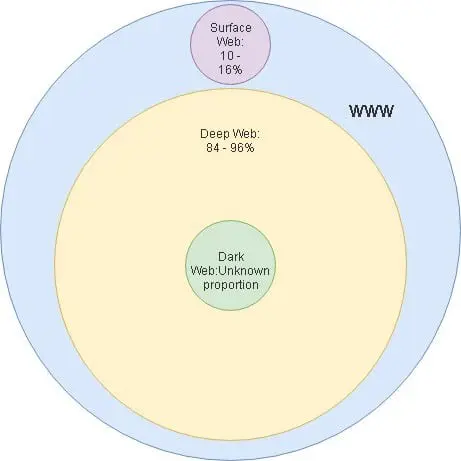What is the difference between the surface web, the deep web, and the dark web?
The Surface Web is, for all intents and purposes, the internet we all know and love to surf, the internet we use to run businesses and connect with family, friends, and customers. Outside the Surface Web, but still within the World Wide Web (WWW), hide the Deep and Dark Webs, two internet arenas that are much maligned, often misunderstood, and often mixed up. The furtive, shadowy, anonymous Dark Web is based on the idea of protecting privacy - something criminals often take advantage of - but the Deep Web is, by definition, simply content that is inaccessible to conventional search engines, which can only access indexed sites. Yes, it is host to much nefarious, illegal content, but it is also home to useful, valuable information you can find nowhere else and that can be a boon to scholars, businesses, and innovative idea mongers.
The Deep and Dark Webs are the boogeymen of the internet; the Surface Web possibly a wolf in sheep’s clothing. Let’s take a moment to unmask them.
Surface web
This is the internet we all know and love. Some researchers call the Surface Web we use for everyday activities like social networking and reading news the Common Web. (If you are a conspiracy theorist, you may be interested in the eight levels of the web, right down to Level 8, “The final boss of the universe.”) Here, conventional web spiders use sophisticated algorithms to collect data from hyperlinked pages and you browse it from search engines like Google or Yahoo.
The Surface Web is, ironically, home to some of the Deep Web. Any web page that requires credentials to access is, technically, part of the Deep Web because a search engine cannot access that content. So, what about a site like Facebook, to which you have to log in but which renders pages that are visible to search engines even when someone is not logged in? In 2007, Facebook opened up some of its listings to search engines. In addition, Facebook links can be indexed, e.g. if there is a page somewhere with your Facebook URL, a search engine WILL be able to index it.
- Also known as Visible Web, Indexed web, and Clearnet
- A fraction of the entire internet with +-19 Terabytes of information
- A handful of the downsides: Trolls and stalkers; exploitation, pornography and violence; addictive, distracting and time-wasting; identify theft and hacking; spam, advertising and intrusion of privacy (Google probably knows your shoe size)
Deep Web
The Deep Web is not just a playground for criminals, drug users, terrorists, and sexual deviants. In a sense, an organization’s intranet is a deep web as nobody outside the company has access to the information in it.
- +- 7500 Terabytes of information
- 95% is publically accessible. The controversial WikiLeaks incident uncovered information that had been stored on the Deep Web for years.
- Inaccessible to “normal” search engines. To use the Deep Web you need to use a special browser, e.g. TOR . TOR is the most popular portal, but others include Freenet, GNUnut and Hotspot Shield. The Tor network was developed in the 1990’s by the United States Naval Research Laboratory to facilitate anonymous communication in the organization.
- The Hidden Wiki is the main entryway to the Deep Web but access with caution
- Websites are not indexed by “normal” search engines, like Google. Popular Deep Web search engines include DeepPeep and IncyWincy.
- In theory anonymous. In reality, certain sites are watched by law enforcement agencies. There is also a risk of being targeted by hackers.
- Illegal activity exceeds approximately $100,000,000. View an infographic created by Norwich University here. According to The SSL Store, cybercrime will generate at least $1.5 trillion in 2018—and that is a conservative figure.
- Your email and online banking information are examples of Deep Web content, i.e. content that is not publicly accessible and not indexed by search engines
- Even Facebook has a Deep Web address, allowing access to users in countries where Facebook is censored. When you log in there, you will use your anonymous Tor IP address.
- A font of little-known information and host to government databases, legal and medical documents and websites that are not yet indexed. For instance, SciHub hosts over 50 million scientific research papers that are free to download.
Dark web
There is something compelling about the Dark Web, in the same way unsavory true crime stories and tales of disaster are lapped up by readers of mainstream news publications. Often confused with the Deep Web, it can be considered the Deep Web’s evil twin. Lurid myths about the heinous, blood curdling activities taking place “down there” abound. But, truth be told, it is not all bad. For many, the Dark Web is simply a place where users can be anonymous, work in isolation, and find information that is not publicly available through normal channels. For some, fed up with the intrusive marketing policies of companies like Google or Facebook, the Dark Web allows them to keep their search habits (nefarious or otherwise) private.
- Security experts estimate that at any given moment there are between 10,000 and 100,000 active sites
- Also known as Darknet, Deep Web, Invisible Web, or Hidden Internet
- Criminals exploit Dark Web anonymity to sell guns, drugs, and humans but governments and the UN also use it to protect political dissidents and hunt criminals
- If your data was leaked in a data breach, this is where it will put up for sale
- It has been reported that the first major digital media organization to create a website on the Dark Web was the New York Times.
- Not impenetrable, white hat hackers and law enforcement have made inroads tracking down criminals, including Ross Ulbricht, an American former drug trafficker and Darknet market operator, who created and ran the Silk Road website, an underground marketplace primarily for drugs, from 2011 until his arrest in 2013. Silk Road was shut down by the FBI in 2014.
- Allows for the frank and open exchange of ideas without censorship
- Enables the gathering of threat intelligence, e.g. information about planned terrorism attacks, money laundering and other criminal activities
- Protects journalists and their sources
- Offers an opportunity to tap data from multiple domains to get a competitive edge when making business decisions and identifying new technology and market trends. With the right tools, you can monitor your competitors’ movements, and find out what customers and your staff are saying about you under the radar of their privacy settings.
- Legal to access but any illegal activity can be prosecuted
Learn how to keep safe in the digital underworld
If you are burning with curiosity to browse the Deep and Dark Webs, educate yourself. First, avoid conspiracy theories. Next, learn exactly how to keep safe in the underworld. InfoSec Institute has a wealth of resources to facilitate safe browsing.












